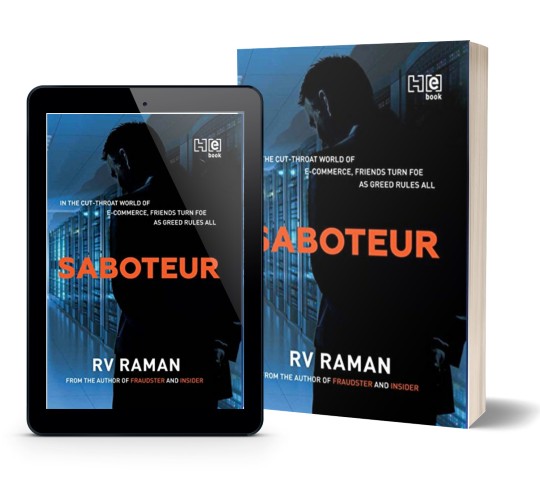To most of us, the world of big money is a mystery. Our interactions are limited to our bank transactions, bill payments, savings, loans, etc. as part of our day-to-day lives. But when it comes to finance at corporate levels, there are many layers and intricacies involved. There are also always people who are smart, but not very ethical, who take advantage of little loopholes here and there to commit white-collar crimes.
This Is Here In For You
Listen To The Podcast:
If you love to listen to the book review over reading, or if you want to go through it while doing other activity, here is our Podcast of this review article. Do listen, and share your thoughts with us.
Spotify:
YouTube:
Amazon Music:
https://music.amazon.in/podcasts/…
Author R V Raman has given us many successful corporate thrillers where he features such stories. He had a brilliant career in the corporate world, and now he gives us richly detailed stories based in this world with interesting characters and thrilling plots. We have been wanting to read his books for some time now and finally I got a chance to read Saboteur from our team. I liked the book and here are my thoughts on it on behalf of Team Thinkerviews.
| Book Title | : | Saboteur |
| Author | : | R V Raman |
| Publisher | : | Hachette India (7 April 2017) |
| # of Pages | : |
352 (Paperback) 1406 KB; 308 (Kindle EBook) |
| # of Chapters | : | 28 |
| Purchase Link(s) | : |
Book Cover:
Let us take a look at the cover page of this book.

Saboteur By R V Raman | Book Cover
Rather then using eye catching and cheerful colors, the designer has opted rightly for dark theme for the cover page of Saboteur. The black illustration of a man in a high-tech server room fits in smoothly with the story. The blueish background complements the theme. Of course, it could have been better, but it is a comparatively good cover page.
Storyline:
At an Indian e-tailing company MyMagicHat, one of the corporate leaders Nilay Adiga is about to wrap up his day. The company is going through “Due Diligence” exercise by a proposed investor company called Kantoff. Puneet – the person in charge of DD has taken a long time for his work and Nilay is getting a bit apprehensive. To make matters worse, his colleague Sundar brings him the bad news of imminent cash crunch.
As they leave, Nilay offers to give Puneet a ride, but Puneet declines saying a car is coming for him. Next day has a lot of surprises in store for Nilay – firstly, his boss Gautam Puraria has found hidden bugs in their corporate office, secondly, Puneet has gone missing.
Puneet’s parents initiate a contact with their distant relative – Inspector Dhruvi Kishore, who works in the white-collar crime division of Bengaluru police. Although missing persons are not her area, she agrees to take a look in the matter.
As Dhruvi slowly learns about what Puneet’’s work was, about the hidden bugs and suspected corporate espionage, she decides to pursue the matter further with her colleague Alex. Things escalate soon as they are faced with someone who is offering confidential data stolen from MyMagicHat.
Gautam Puraria informs rest of his family – his father Shashikant Puraria – head of PRL and his much older brothers Raj and Dileep. While PRL is a big name in Indian retail, MyMagicHat is Gautam’s baby.
Dhruvi and Alex capture the culprits behind the data theft, but instead of answering their questions, they soon are further baffled by analysis of the retrieved cartridge. MyMagicHat’s IT expert Moin Aziz is murdered not long after and these leaves rest of the staff shaken and still without the whole picture?
Things are getting serious now. With Moin murdered, Puneet missing and billions of dollars at stake, who will go next? Will Dhruvi solve this puzzle in time? Is it an insider or an outside who is bringing about MyMagicHat’s destruction?
Views and Reviews:
I enjoyed this book for not only its fast pace and thrills, but also the detailed information and insights it gives in the world of electronic retailers, i.e., e-tailers. We hear in media about the huge money that companies like Amazon are generally making or losing in new markets like India when they first come in and compete against the traditional way of shopping through physical retailers. They invest massive amount of money in brand building.
While the huge discounts and free shipping are great conveniences for the customers, that cannot be logically profit making if the e-tailers are selling at prices lower that MRPs. In reality, an e-tailer is only a convenience platform, while the goods still need to be supplied in physical form from a physical seller – whether a manufacturer or a trader – somewhere. Adding to it the IT and communication costs, the e-tailer can hope to make money only in a future where they have built a loyal customer base and will be able to raise their prices.
How then do they manage to keep operating? They obtain money from various investors, and as their stocks slowly rise in a favourable market, the initial investors usually make good money on their investment and exit. Someone else then picks up the stock and so on. In theory, the Indian e-commerce is going to be massive by anybody’s imagination and there are a lot of interested investors. But the traditional way of evaluating a company’s worth is of no use here:
The traditional way of valuing a company is through projecting its revenues, costs and profits over next five to ten years. But this couldn’t work in the e-tailing industry, as no company made a profit. In fact, they incurred such huge losses that traditional valuation methods were rendered unusable.
Also, the e-tailers can play with their products to make the picture look a lot rosier than it is:
Who is to say what the real MRP is? Any retailer – electronic or physical – can boost his GMV by selling little known brands at an inflated MRP and offering a high discount. Not only does a huge discount give buyers an illusion of a good deal, but it also inflates the GMV.
Talking about the initial losses, sometimes it is the e-tailer who has to pay the seller, because they advertise huge discounts on their site:
Gap-funded transactions – Transactions where MyMagicHat sells below the seller’s price and funds the discount through incentives and marketing cost reimbursement. No cash actually comes from the seller to MyMagicHat!
Keeping all this in mind, the seriousness of the situation is understandable when a person performing ‘Due Diligence’ disappears. From hereon, the author reveals layer upon layer of complex problems that are all interlinked. I also liked the characters as they are so real life like, especially Nilay, Vibha, Moin, Alex. Nilay’s character is very ambitious but like many other middle-class boys and girls who go through engineering and management colleges to jump into the corporate pool, only to find that it will take more than intelligence to travel through its murky depths. And not to forget the business mogals – the Purarias. We can see how the ethical lines are blurred as the amount of money in question starts rising:
In a different context, twenty lakhs would have been sufficient to indict a CEO or even bring down a chief minister. But for an unregulated private equity fund that dealt in thousands of crores of other people’s money, it was seen as trivial.
R V Raman is known to feature strong female characters in all his books. Here, he gives us the bullet riding lady inspector Dhruvi Kishore who brings the whole chain of events together through her intelligence and perseverance. The author also gives us a realistic view of the world where women are still making their mark:
As one of the few female Inspectors around, there was constant pressure on her to perform, to not give her detractor the slightest of excuses. While the system itself did not overtly discriminate against women, there were times when she wondered if she was being measured by the same yardstick that her male colleagues were.
The book is very thought-provoking in terms of how our purchase decisions as a consumer affect so many lives and future of big companies. There is no denying the convenience that e-tailers offer in busy days and hectic routines and while Indians are canny enough to go for the sweetest deal, we also need to think in terms of sustainability – where is our order really coming from? Do we really need to purchase something just because it is on discount? Are we just fuelling corporate greed and unsustainable lifestyle on our planet by buying things we don’t need or can obtain from a place near us?
Summary:
An enjoyable, thought-provoking corporate thriller that is a ‘must-read’ for all those who like to understand the corporate world and learn about the dark side associated with glamour of success and money.
ThinkerViews Rating:
Around 8 out of 10.
Quick Purchase Link(s):
- Buy – Saboteur By R V Raman – Paperback – Amazon India
- Buy – Saboteur By R V Raman – Kindle Ebook – Amazon India
- Buy – Saboteur By R V Raman – Paperback – Amazon US
- Buy – Saboteur By R V Raman – Kindle Ebook – Amazon US
Over To You:
If you already have read the book do share your remarks and thoughts via comments below. Does this review help you in making your decision to buy or read the book? Do not forget to share this article with your friends over various social networks via Twitter, Facebook and others. And yes, you may like to subscribe to our RSS feeds and follow us on various Social networks to get latest updates for the site to land right in your mail box.
 ThinkerViews – Views And Reviews Personal views and reviews for books, magazines, tv serials, movies, websites, technical stuff and more.
ThinkerViews – Views And Reviews Personal views and reviews for books, magazines, tv serials, movies, websites, technical stuff and more.



